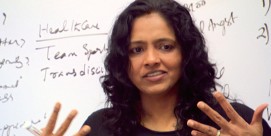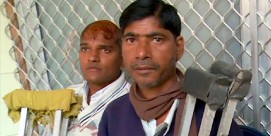In This Episode << SLIDE LEFT TO SEE ADDITIONAL SEGMENTS
Surrogate Mothers in India
FRED DE SAM LAZARO, correspondent: Minutes after delivering a slightly premature infant by C section, Dr. Nayna Patel was back in her office and on the phone to the parents.
Dr. Nayna Patel: Congratulations, it’s a baby girl. Where are you, in Mumbai right now?
DE SAM LAZARO: They were en route from their home in England and didn’t reach the small town of Anand, India in time to watch a surrogate mother give birth to their child.
Dr. Patel: Surrogate is also fine. The baby is also fine. We have taken the picture.
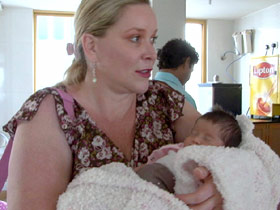 DE SAM LAZARO: Dr. Patel has delivered some 400 surrogate babies since 2004. Her clinic implants embryos in surrogates she recruits from the area and pays around $7,000 for a pregnancy carried to term. Biological parents come from across India and around the world. Kirshner Ross-Vaden came here from Colorado to pick up her baby girl named Serenity. She was born four weeks premature, but after a week in neonatal intensive care she was ready to be discharged. Serenity’s 46-year-old mother traveled here with her nine-year-old son. She had tried unsuccessfully in recent years to conceive. Surrogacy was her last hope and India her first choice. The cost—$10,000 to $15,000 all told—is a fraction of what it is in the United States, and in America, she added, surrogacy contracts are not always air-tight.
DE SAM LAZARO: Dr. Patel has delivered some 400 surrogate babies since 2004. Her clinic implants embryos in surrogates she recruits from the area and pays around $7,000 for a pregnancy carried to term. Biological parents come from across India and around the world. Kirshner Ross-Vaden came here from Colorado to pick up her baby girl named Serenity. She was born four weeks premature, but after a week in neonatal intensive care she was ready to be discharged. Serenity’s 46-year-old mother traveled here with her nine-year-old son. She had tried unsuccessfully in recent years to conceive. Surrogacy was her last hope and India her first choice. The cost—$10,000 to $15,000 all told—is a fraction of what it is in the United States, and in America, she added, surrogacy contracts are not always air-tight.
KIRSHNER ROSS-VADEN: You can sign a hundred documents. It doesn’t matter. If that surrogate changes her mind she can sue you for that child, and oftentimes she will win, and coming here to India, these women, they don’t want my child. It’s very cut and dry. They do not want my child. They want my money, and that is just fine with me.
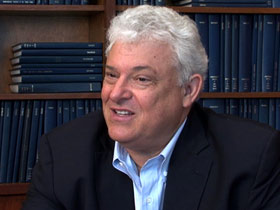 DE SAM LAZARO: It’s not fine with everyone.
DE SAM LAZARO: It’s not fine with everyone.
DR. ARTHUR CAPLAN (University of Pennsylvania): The contracts usually are written, to be blunt, to protect the wealthy people who are commissioning the baby, so that if the woman suffers an injury, if the woman has a health problem due to childbirth, if there’s a long-term chronic condition, then what?
DE SAM LAZARO: University of Pennsylvania ethicist Arthur Caplan worries the relationship is inherently lopsided between poor, minimally literate women and well-heeled couples who commission them to have their children. For example, surrogates in India are routinely implanted with up to five embryos to improve the chances of a pregnancy. In the US, clinics usually implant no more than two, sometimes three.
DR. CAPLAN: Why would you use three, four, five embryos in India? Because you don’t want the couple to have to come back. It’s expensive, even for a rich person so you’re trying to maximize the chance of pregnancy, even if it might compromise the interests of the babies.
DE SAM LAZARO: Dr. Patel concedes that implanting five embryos heightens the risk for infants and mother and says she is now lowering the number to three or four. But she says the downside of fewer embryos is a lower pregnancy success rate. When multiple embryos develop into viable pregnancies, Dr. Patel’s policy is to reduce them by selective abortion. Aside from possible religious concerns, this process could present medical risk to the surviving fetuses.
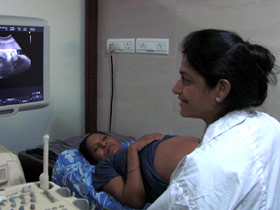 DR. PATEL: Parents—yes, there are some who say right from the beginning, “Doctor, put less embryos because we are not for reduction, and we don’t this to happen.” So in those cases we definitely never transfer more than two. But there are certain parents who don’t have any objection to this, and surrogates—we don’t allow them to carry more than two.
DR. PATEL: Parents—yes, there are some who say right from the beginning, “Doctor, put less embryos because we are not for reduction, and we don’t this to happen.” So in those cases we definitely never transfer more than two. But there are certain parents who don’t have any objection to this, and surrogates—we don’t allow them to carry more than two.
DE SAM LAZARO: Dr. Patel insists that her facility protects the interests of surrogates as much as the clients of her commercial surrogacy program and the infants she delivers.
DR. PATEL: We do a lot of psychological counseling for the surrogate and the family before we recruit them. We explain to them the procedure of IVF, what all they’ll have to undergo. If she has had any complications during her previous pregnancy, we will ask her not to become a surrogate, because the same can repeat this time, to make it very sure and safe for her.
DE SAM LAZARO: The moment their pregnancies are confirmed, surrogates are required to move into this home run by Dr. Patel. They’re offered skills training in things like tailoring, but mostly it’s a quiet, sedentary life. The women who spend nine months in this surrogate hostel have all experienced childbirth with their own biological children. It’s a prerequisite for becoming a surrogate. What very few of them have experienced with those previous pregnancies is any kind of prenatal care. That’s in sharp contrast to the pampering they get here: meals provided and medical attention, should they need it, round the clock. Dr. Patel acknowledges the irony but says it is part of a thorough surveillance to ensure smooth pregnancies, for both surrogate and parents’ sake.
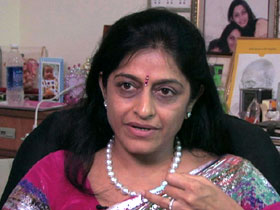 DR. PATEL: We have a fetal medicine specialist who checks all the surrogates every three weeks. We have been able to detect minor congenital malformations which we inform the couple can be treated post-delivery without any impact on the baby. We have had patients whose surrogates had babies with Down syndrome, which was detected, which was confirmed with amniocentesis, and we have aborted those babies after the consent of the couple.
DR. PATEL: We have a fetal medicine specialist who checks all the surrogates every three weeks. We have been able to detect minor congenital malformations which we inform the couple can be treated post-delivery without any impact on the baby. We have had patients whose surrogates had babies with Down syndrome, which was detected, which was confirmed with amniocentesis, and we have aborted those babies after the consent of the couple.
DE SAM LAZARO: Well in advance, she says, parents are consulted on decisions like pregnancy termination. Similarly, parents must accept their babies, once born, whether healthy or not. Surrogates we spoke to talked about building a new home and using their money for their children’s education. The money—$7,000-$8000—would otherwise take them decades to earn. Most say they were happy to have helped infertile couples. The woman who bore baby Serenity who we met earlier, admitted to some sorrow at her separation.
DHANA: You can’t help it when you’ve carried a baby for nine months. I’d like to see how she does in the future.
ROSS-VADEN: I do have her address, so I can get a hold of her. And I hopefully will be able to maintain some kind of a relationship with her.
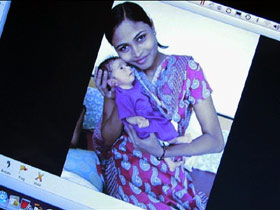 DE SAM LAZARO: We caught up with Serenity’s mother in Mumbai, about 500 miles from Dr. Patel’s clinic. She and son Brandon were holed up in a hotel awaiting DNA test results and myriad documents to satisfy the Indian and US governments that the infant could leave the country.
DE SAM LAZARO: We caught up with Serenity’s mother in Mumbai, about 500 miles from Dr. Patel’s clinic. She and son Brandon were holed up in a hotel awaiting DNA test results and myriad documents to satisfy the Indian and US governments that the infant could leave the country.
ROSS-VADEN: Am I living happily ever after now? I certainly hope so. I hope that I can get her home, and I hope that she is a happy, healthy little baby, and that is what I will have—a healthy, happy little girl.
DE SAM LAZARO: But will every surrogacy story end happily? Right now, India has only voluntary guidelines, and it’s not clear whether future laws would be adequately enforced, and standards vary widely. For example, Dr. Patel says she only serves infertile patients. But some clinics offer surrogates to healthy parents who, for career or convenience, want to avoid pregnancy. Ethicist Caplan worries about where all this is leading.
DR. CAPLAN: We may get into situations where people start to say, as genetic knowledge improves, you know, I’m not infertile but I’d like to make a baby with traits or properties that I want to avoid or that I desire. That day is coming. I think it’s important to keep in mind, as we watch the evolution of surrogacy as an international activity, what is really something that a tiny handful of people use who suffer from infertility tomorrow can be what more people are interested in because they have a more eugenic, more perfectionist interest in making their children.
DE SAM LAZARO: For her part, Dr. Patel plans a major expansion of her one-stop surrogacy shop, a leader in what’s now a half-billion-dollar industry in India. She makes no apologies for making a lucrative living and insists that she, the surrogates, and the new parents all come out winners.
For Religion & Ethics NewsWeekly, this is Fred de Sam Lazaro in Anand, India.


